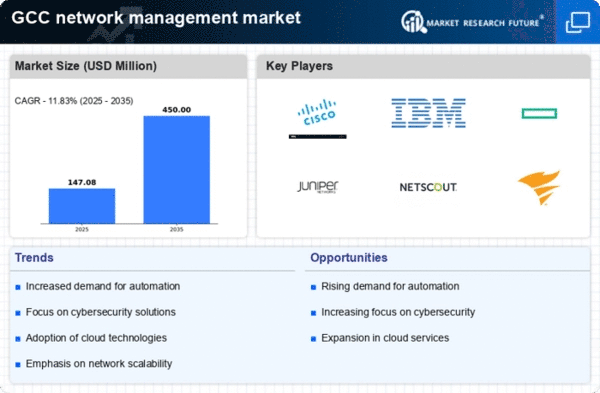Expansion of IoT Devices
The proliferation of Internet of Things (IoT) devices is significantly impacting the network management market. In the GCC, the number of connected IoT devices is projected to reach 1 billion by 2026, creating a pressing need for effective network management solutions. This influx of devices necessitates advanced management tools to handle increased data traffic and ensure seamless connectivity. Consequently, organizations are investing in network management solutions that can efficiently monitor and manage these devices. The market is likely to see a compound annual growth rate (CAGR) of 15% as businesses adapt to the complexities introduced by IoT.
Shift Towards Managed Services
The shift towards managed services is reshaping the landscape of the network management market. Many organizations in the GCC are opting for managed service providers to handle their network management needs, allowing them to focus on core business activities. This trend is driven by the desire for cost efficiency and access to specialized expertise. Managed services can reduce operational costs by up to 20%, making them an attractive option for businesses. As a result, the network management market is likely to see increased adoption of managed services, with providers offering tailored solutions to meet the diverse needs of organizations.
Rising Demand for Network Resilience
The network management market is experiencing a notable surge in demand for enhanced network resilience. Organizations in the GCC are increasingly recognizing the necessity of robust network infrastructures to ensure uninterrupted operations. This demand is driven by the growing reliance on digital services and the need to mitigate risks associated with network failures. According to recent data, the GCC region has seen a 30% increase in investments towards network resilience solutions. As businesses expand their digital footprints, the network management market is poised to benefit from this trend, with companies seeking solutions that provide real-time monitoring and rapid recovery capabilities.
Regulatory Compliance and Data Governance
Regulatory compliance is becoming a critical driver for the network management market in the GCC. With the introduction of stringent data protection laws, organizations are compelled to adopt comprehensive network management solutions to ensure compliance. This trend is particularly evident in sectors such as finance and healthcare, where data governance is paramount. Companies are investing in network management tools that facilitate compliance with regulations, thereby reducing the risk of penalties. The market is expected to grow as organizations prioritize solutions that not only enhance operational efficiency but also ensure adherence to legal requirements.
Increased Focus on Network Performance Optimization
The network management market is witnessing a heightened focus on performance optimization. As businesses in the GCC strive for operational excellence, there is a growing emphasis on maximizing network efficiency. Organizations are increasingly adopting solutions that provide insights into network performance, enabling them to identify bottlenecks and optimize resource allocation. This trend is supported by the fact that companies that implement performance optimization strategies can achieve up to a 25% reduction in operational costs. Consequently, the demand for advanced network management tools that facilitate performance monitoring and optimization is on the rise.
















